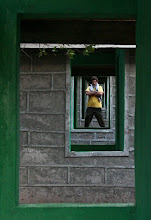“I put the brains in the creek.”
“Thanks for doing that,” Brett replied.
Every animal has enough brains to tan its own hide, I hear.
It was just one day earlier when I told Brett that I feel like I’m coming into a place in my life where I need to start killing things.
All part of this becoming a man business, I suppose.
The river felt smooth and heavy around my knees, and the fish slick and foreign in my hands, and I said “Gracias” three times, and on the third one I sliced the spinal column at the base of the head.
It felt right, sitting there beside a Patagonian stream, roasting trout over a twig fire.
When I returned to camp the cordera lay hogtied. The gauchos called me Asesino, and handed me the knife.
A few fish were enough for one day, and I passed the knife to Nate. Excitement and fascination burned as I watched him put force and blade through that little sheep’s jugular.
It took it easy on us. Didn’t cry out. Didn’t really even seem to mind much. Just a few strong kicks, and those final, harsh exhales.
The gauchos helped us remove its soft, blood-stained coat, and threw the pungent, grass-filled guts to the dogs.
Skinned and tied up on a tree, I could still see convulsing and twitching of flesh and muscle.
Perhaps I wasn’t crazy after all, when on that morning I was sure Dad was still breathing, or when I thought I saw his eyes open.
At what point is death, death? Most every cell in that sheep’s body was still alive, yet we all agreed it was dead, as it hung there, headless.
Is life truly just a miraculous balance of organized nerves, blood, some bones and flesh? Could it be that simple?
Were my father’s stories nothing more than a harmony of sparks raining down in the spongy canals of his brain?
Peel your body apart for me, and show me where your imagination lies. Can I hold it? Ah yes, just as I imagined, a wrinkled hand full of molten opals.
And your love, is that it there? That blood-choked heart filled with smooth, wild-eyed rubies?
Nate cracked the sheep’s skull open, and removed its fistful of brains from the wet, dog-gnawed head. Its vacant eyes resembled small, green glass buoys.
We ate the heart and tongue first, sautéed with garlic and oil as an appetizer. I thought of my own heart and tongue. Love and lovemaking.
They were soft and sweet and chewy.
We are a supermarket people, and now strung up on the asador beside the coals, the body of the cordera looked a little more familiar. Food. Most of us sat quietly, watching the fat drip and hiss on the ash below.
I could feel hot tears boiling behind my eyes, hardening into stone. Not because I didn’t agree. Not because one life had ended to help sustain sixteen others. Not even because we would all just wake up hungry again tomorrow.
I wanted to cry because life goes on, and sometimes when you witness death’s cool ease, it can start feeling pretty lonely to be stuck in a body.
But for now, life does go on, and we still need to treat our guests with courtesy. We still need our mate′ water to be at the right temperature. We still need to put on a tough face and keep trudging onward through this murky abyss.
The sheep is now forever, but all of us, we are still temporary. And one day, when you sing your spirit free, and wrap yourself in a blanket of fire, someone will be offered a seat, handed a hot mate′, and they will discuss the winter,
while you, unnoticed and forgotten, are flying through the molten stained glass into the cool, silver moonlight.
The meat was hot and tender. As my stomach swelled and warmed, it all seemed to make sense again, this business of living and dying.
While we ate the cordera, we passed around boxes of wine, and when we were finished, we sang songs, all of us huddled around the fire.
At what point is life, life? Without that meat there would be no songs, no bedtime stories, no throwing wild handfuls of smooth rubies at one another.
We all agreed that the sheep was dead, and with full bellies, while staring into the fire, we sang it back to life.
February 2007
Provincia de Neuquen, Argentina
